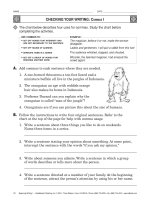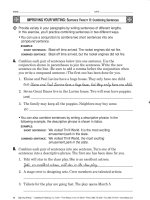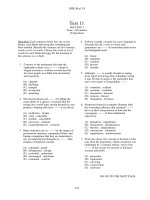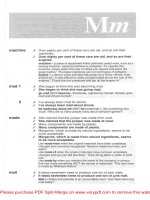Tài liệu Beginning writing 1 part 2 pdf
Bạn đang xem bản rút gọn của tài liệu. Xem và tải ngay bản đầy đủ của tài liệu tại đây (235.45 KB, 10 trang )
CREATIVE WRITING
66 EXPANDING SENTENCES
Answers will vary.
67 USING YOUR SENSES
A. 1. babbling, meow, whisper 2. aroma, stinking,
fragrant 3. painful, prickle, burn 4. sour,
tangy, flavorful 5. sparkle, pale, scarlet
B. Answers will vary.
68 HAIKU
A. The / dew / drops / fal/ ling
By / ones / and / twos, / rap/id/ly,—
It / is / a / good / world.
B. 1. nature 2. three 3. five 4. seven
5. first 6. does not
C. 1. b 2. a
69 WRITING ABOUT PICTURES
Answers will vary.
70 WRITING ABOUT PEOPLE
A. 1. swaggered 2. tossed 3. piercing
4. smile 5. cat 6. whispered
B. Answers will vary.
71 LAUGH OUT LOUD! What’s in a Name?
A. 1. d 2. e 3. h 4. k 5. l 6. b 7. i 8. c
9. f 10. a 11. j 12. g
B. Answers will vary.
72 REVIEW
A. ACROSS: 1. character 4. vivid 5. touch
7. senses 9. image DOWN: 2. haiku
3. taste 6. hearing 7. smell 8. sight
B. Answers will vary.
CHECKING YOUR WRITING
73 SPELLING DEMONS
A. 1. e 2. d 3. a 4. b 5. c 6. f 7. h 8. g
B. combination, relative, invitation, competition,
preparation, declaration, perspiration, author
74 DOUBLE TROUBLE
A. 1. hoping 2. scraping 3. hopped
4. moped 5. robbed
B. 1. biggest 2. thinnest 3. begged 4. tagged
5. bigger 6. madder 7. betting 8. hitting
C. 2. holy, holly 3. desert, dessert 4. hot, hoot
5. raged, ragged 6. ad, add 7. hoping,
hopping
75 LETTERS OFTEN LEFT OUT
A. 1. bakery, chocolate 2. federal, veterans
3. sophomores, history 4. average, salary,
government 5. several, environment
B. 1. ordnary, Febuary, evry, intresting, celbrate,
substatute
CHALLENGE:
76 CAPITALIZATION I
1. September 2. Angela, Halloween
3. Captain Hook, Angela, Peter Pan
4. Monday 5. Julio’s Sweets Shoppe, Beach
Boulevard 6. Dr. Richard’s 7. Thursday,
November, Thanksgiving
77 CAPITALIZATION II
A. 1. scientist, Professor 2. laboratory, Mount,
Park 3. park, Doctor
B. 1. New York City 2. Hudson River 3. none
4. Uncle Ted, Kansas City 5. none
78 COMMAS I
A. 1. A one-horned rhinoceros, a ten-foot lizard,
and a miniature buffalo all live in the jungles
of Indonesia. 2. The orangutan, an ape with
reddish-orange hair, also makes its home in
Indonesia. 3. Professor Durand, can you
explain why the orangutan is called “man of
the jungle”? 4. Orangutans are, if you can
picture this, about the size of humans.
B. Answers will vary.
79 COMMAS II
A. 1. Because they are big, football players
usually eat a lot. 2. At our school,
assemblies are held in the gym. 3. The
committee was made up of the following four
students: Carol Sue, Carlos, Molly, and Ruth.
4. For those who love chocolate, chocolate
cake is the perfect dessert. 5. The five stars
of the play were Peggy, Anthony, Mary, Jo,
and Sam. 6. Rather than red, orange is my
favorite color. 7. Instead of Michael, Jordan
received the award. 8. While Brenda was
climbing down, the ladder slipped.
9. Recognizing the man as his uncle, Joseph
shouted a welcome.
B. That that is, is. That that is not, is not. Is that
not it? It is!
80 PUNCTUATING QUOTATIONS I
A. Students should check 1, 3, and 4.
B. 1. b 2. a 3. a 4. b
INTERESTING
CU
OE B
RLF S
DEET
IBI
NRRT
AUAU
RAT
YREE
EVERY
viii
81 PUNCTUATING QUOTATIONS II
Bosco studied the weird machine. He
read the strange sign.
“
Enter here to
travel through time,
”
the words said.
“
All
tickets ten dollars.
”
“
Would you like to buy a ticket?
”
asked
a little round man in a blue suit.
“
You can
go forward, backward, or any-which-way!
”
Bosco was fascinated.
“
How can I pass
up this opportunity?
”
he whispered. He
pulled out a ten-dollar bill.
“
All aboard,
”
shouted the little man.
“
Quickly now. Quickly now!
”
Bosco climbed three metal stairs and
passed through a swinging gate. He heard
a lock click behind him. Suddenly he felt
nervous.
“
I’ve changed my mind,
”
he called out.
“
Too late!
”
said the little man.
“
Have a
good journey.
”
The strange contraption shook and
groaned as it hurled Bosco into the future.
82 UNNECESSARY REPETITION
A. 2. on his face 3. quickly 4. shape
5. victorious 6. round
B. 2. Doctors help their patients by treating
illnesses. 3. When I once had trouble
walking, I hurried to a doctor. 4. Tests
showed that I needed a knee operation.
83 DOUBLE NEGATIVES
A. 1. ever 2. any 3. anybody 4. any 5. no
6. ever
B. Students should check 1, 3, and 4.
84 PROOFREADER’S MARKS
A. 2. You can lead a hors to water but you
cant make it drink.
3. Evry cloud has a Silver lining
4. Dont bit the hand that feeds yuo.
5. Theres more than one way too skin
a Cat.
B. 1. Half a loaf is better than none.
2. You can lead a horse to water, but you
can’t make it drink.
3. Every cloud has a silver lining.
4. Don’t bite the hand that feeds you.
5. There’s more than one way to skin
a cat.
85 LAUGH OUT LOUD! Misspelled Words
A. 1. laff=laugh 2. recieved=received
3. Acurrate=Accurate 4. proff=proof
5. grammer=grammar 6. carrot=karat
7. dames=dams 8. boys=buoys
B. 1. b 2. b 3. a 4. a 5. b
86 REVIEW
A. 2. Odin wanted to be wise as well as strong.
3. “I will drink from the Well of Wisdom,” Odin
said. 4. “The water is not free,” said the
guardian of the well. 5. The price of a drink
was very high. 6. “You must give me one of
your eyes, Odin,” said the guardian. 7. Odin
gained wisdom, the ability to see the future,
and the respect of all the gods.
B. 1. Shaniko is a ghost town in the high desert of
Oregon. 2. It’s called a ghost town because
most of the people are gone, and the buildings
are abandoned. 3. In the early 1900s Shaniko
was a boom town, a bustling railroad hub. 4. A
sign on the road into present-day Shaniko
reads, “Population 30.” 5. Some visitors say
they hear ghostly laughter in the schoolyard.
IMPROVING YOUR WRITING
87 SENTENCE VARIETY I:
Varying Sentence Beginnings
2. preposition 3. verb 4. preposition
5. adverb 6. preposition
88 SENTENCE VARIETY II:
Combining Sentences
A. 2. Seven Great Danes live in the Lavine house,
and two will soon have puppies. 3. The family
may keep all the puppies, or neighbors may
buy some.
B. 2. A stage crew of talented artists is designing
sets. 3. Tickets for the play, which opens
March 5, are going fast.
89 SENTENCE VARIETY I:
Avoiding “And” Sentences
A. 1. b 2. a
B. Answers will vary.
90 CONCISE WRITING
A. 1. b 2. d 3. a 4. c
B. This launched his career; The cartoon did well;
The rodent was very humorous; She thought it
was not the right choice.
91 AVOIDING MIXED COMPARISONS
A. Students should check 2, 3, and 4.
B. Answers will vary. Possible answers:
2. His mind galloped from thought to thought
like a nervous horse. 3. The warmth of the
sun wrapped itself around our campsite like a
blanket. 4. The teacher growled at the tardy
students like a bear.
92 RECOGNIZING FACTS AND OPINIONS
A. 1. F 2. O 3. T 4. F 5. T
B. 1. O 2. O 3. F 4. F 5. O
e
e
e
ix
93 QUALIFYING OPINIONS
A. Students should check 1, 3, and 6.
Underline:
2. Mike thinks; 4. In my opinion; 5. I
think
B. Students should circle 1, 3, and 4.
1. Most students can benefit from a
physical education class. 3. I think Mr.
and Mrs. Wilson have overly strict rules
for their children.
4. It seems that no amount of arguing
will convince the Wilsons to change
their minds!
94 MAKING AND QUALIFYING
GENERALIZATIONS
A. Answers will vary. Possible anwers:
1. Most 2. Many 3. supposedly
4. usually
B. Answers will vary. Possible anwers:
2. Annmarie will likely make a good
doctor some day. 3. At the
tournament, our debate team should
be hard to beat! 4. Our house may
need a new roof in three to five years.
5. The growing population will likely
lead to overcrowding.
95 WORD CHOICES
A. 1. pranced 2. growled 3. mature
4. moderate, quaint 5. screamed
B. Answers will vary.
96 NEW BEGINNINGS
A. 1. a 2. b 3. a 4. b
B. Answers will vary.
97 EFFECTIVE ENDINGS
A. 1. a 2. c
B. thus, in conclusion, in summary
98 WRITING TITLES
A. 1. c 2. a 3. d 4. b
B. 1. Tales from the Titanic 2. The Lady or the
Tiger? 3. Chief Joseph: Man of Honor
99 LAUGH OUT LOUD! Headline Horrors
2. Students upset by teacher strike
3. Man-eating sharks spotted offshore
4. Woodview Heights man murdered
5. Burglar robs Richard’s Pants Shop
6. More meat-eaters deciding to eat vegetables
7. New law cuts curfew violations in half
8. U.S. steel giant puts end to strike
9. Two small planes collide; one person dies
10. Free clinic offers medical care for the poor
10 0
REVIEW
A. 1. vary in length 2. different parts of
speech 3. a generalization 4. qualify
5. summarize ideas 6. gets to the
point without wasting words
B. Answers will vary. Possible answers:
1. Scientists think humans could live on Mars,
but there is no food or water there. 2. Mars,
one of our closest neighbors in space, has
been called Earth’s “red twin.”
x
Saddleback Publishing, Inc. © 2001 • Three Watson, Irvine, CA 92618 • Phone: (888) 735-2225 • Fax: (888) 734-4010 • www.sdlback.com •
Beginning Writing 1
1
NAME DATE
UNDERSTANDING PARTS OF SPEECH: NOUNS
A
noun
is a word that names a person, place, thing, or idea.
A
common noun
names any person, place, thing, or idea.
A
proper noun
names a specific person, place, thing, or idea.
EXAMPLES:
COMMON NOUNS: student, forest, pencil, confusion
P
ROPER NOUNS: Howard, Everglades, Statue of Liberty
A.
First underline all the nouns in the following sentences.
Then write CN above each common noun and PN above
each proper noun.
1. Emily was training herself to become a spy.
2. The teenager anxiously prepared to complete her first mission.
3. Emily took off her shoes and tiptoed across the carpet.
4. The young spy quietly opened the door and peeked into the bedroom.
5. “Margo isn’t doing her homework!” Emily yelled to her mother.
6. “I hate sneakiness!” Margo shouted at her sister.
B.
Rewrite each sentence. Replace the boldface common noun with a
specific proper noun. The first sentence has been done for you.
1. The seashore is my favorite vacation spot.
____________________________________________________________________
2. The teacher carefully explained the rules.
____________________________________________________________________
3. Passengers were upset when the airline canceled flights.
____________________________________________________________________
4. The store offered a refund to every unhappy customer.
____________________________________________________________________
CHALLENGE: Select one of the proper nouns from Part B. On the back of
this sheet, write three sentences telling about that person, place, or
thing. For example, you might write three sentences about Waikiki
Beach. Circle each noun you use.
Waikiki Beach is my favorite vacation spot.
2
Beginning Writing 1
• Saddleback Publishing, Inc. © 2001 • Three Watson, Irvine, CA 92618 • Phone: (888) 735-2225 • Fax: (888) 734-4010 • www.sdlback.com
NAME DATE
UNDERSTANDING PARTS OF SPEECH: COLLECTIVE NOUNS
A
collective noun
names a group of persons or things. The word
jury
is a
collective noun. So is the word
committee
.
A.
Write a letter to match each collective noun in the first column with its
description in the second column. The first one has been done for you.
1. _____
crowd a. a group of many
2. _____
flock b. a lot of bees flying together
3. _____
swarm c. a great number of persons gathered together
4. _____
class d. women who feel a common bond
5. _____
sisterhood e. students who meet with a teacher
Depending on how the collective noun is used in the sentence, it may take a
singular or plural verb. Here are the rules:
• If you are thinking of the collective noun as a single unit, use a singular verb.
EXAMPLE: The
committee
is meeting once a month.
• If you are thinking of the group members as separate individuals, use a plural verb.
EXAMPLE: The
jury
are entering the courtroom one by one.
B.
Read each sentence about the 1980s. Then underline the collective
noun that is the subject of the sentence. Finally, circle the verb form
that agrees with the subject.
1. The year is 1981, and the Senate ( has / have ) voted to make
Sandra Day O’Connor the first woman on the Supreme Court.
2. Today, as in the ’80s, a family often ( needs / need ) more than one
wage-earner.
3. It is 1980, and the team from the United States ( is / are ) not
attending the summer Olympic Games.
4. The Soviet army ( had / have ) invaded Afghanistan in December of 1979.
5. President Jimmy Carter and the U.S. Olympic Committee
( has / have ) called for a boycott of the Moscow games.
CHALLENGE: On the back of this sheet, write a brief news report about a
concert, a big game, or some other group event. Circle each collective
noun you use. Be sure to use the correct verb form.
c
Saddleback Publishing, Inc. © 2001 • Three Watson, Irvine, CA 92618 • Phone: (888) 735-2225 • Fax: (888) 734-4010 • www.sdlback.com •
Beginning Writing 1
3
NAME DATE
UNDERSTANDING PARTS OF SPEECH: VERBS
Verbs
are words that express an action or a state of being. Action verbs
(run, talked, went) tell what people
do
. Other verbs (is, am, are) express
a
state of being
.
A.
Add a verb to complete each sentence. Then, on the line before the
sentence, tell what the verb expresses. Write A for action or S for
state of being.
1. _____ Many people ____________________ the taste of chocolate.
2. _____ Montezuma, a ruler of the ancient Aztecs, _________________
50 cups of hot chocolate a day.
3. _____ Hot chocolate ____________________ still a favorite drink.
4. _____ Chocolate, however, ____________________ quite high in calories.
5. _____ Do you ____________________ chocolate or vanilla?
Most verbs change form to show the
time
something is happening. The form
of a verb shows whether something is happening now, has happened in the
past, or will happen in the future.
EXAMPLES: The car needs a tune-up. (present)
The car needed a tune-up last month. (past)
The car will need a tune-up in three months. (future)
B.
The action in the following paragraph takes
place in the present. First underline each verb.
Then rewrite the paragraph on the back of this
sheet. Replace each present-tense verb with
a past-tense verb. The first one has been done
for you.
In my grandma’s living room is a portrait
of Elvis Presley on black velvet. Everyone in
the family voices an opinion about the picture.
Uncle Leo calls it hideous. Aunt Sally groans when she
looks at it. When I look at the picture, I feel happy. I believe
it is the most beautiful thing in Grandma’s house.
was
was
4
Beginning Writing 1
• Saddleback Publishing, Inc. © 2001 • Three Watson, Irvine, CA 92618 • Phone: (888) 735-2225 • Fax: (888) 734-4010 • www.sdlback.com
NAME DATE
UNDERSTANDING PARTS OF SPEECH: VERB PHRASES
One or more
helping verbs
are often used along with the
main verb
in a
sentence. Together, the helping verb or verbs and main verb make up a
verb
phrase
. A helping verb can show time or add meaning to the main verb.
EXAMPLES: The mechanic
will
check the tires before we leave.
The mechanic
should
check the fluid levels too.
The mechanic
has
been
working for an hour.
Sometimes the words in verb phrases are separated by other words.
EXAMPLES: You
should
not
pay
your bill until the work is completed.
I
had
never
seen
such a big repair bill!
Find the complete verb phrase in each
sentence. Write it on the line. Hint: The
number in parentheses tells how many
words are in the verb phrase.
1. During World War II, a homing pigeon
named Beachcomber would carry messages
across enemy lines. (2) ____________________
2. In all, 32 homing pigeons were used in the war. (2) ____________________
3. Homing pigeons have been used for service
and for sport. (3) ____________________
4. Their owners will often release them far
from home. (2) ____________________
5. The birds will cleverly find their way across
many miles. (2) ____________________
6. A racing pigeon must reach its home loft
as quickly as possible. (2) ____________________
7. That weary bird over there must have
been flying all day! (4) ____________________
CHALLENGE: On the back of this sheet, write three sentences about a race or
contest. Use a verb phrase in each sentence. Circle the main verb and
underline the helping verb in each verb phrase.
Saddleback Publishing, Inc. © 2001 • Three Watson, Irvine, CA 92618 • Phone: (888) 735-2225 • Fax: (888) 734-4010 • www.sdlback.com •
Beginning Writing 1
5
NAME DATE
UNDERSTANDING PARTS OF SPEECH: IRREGULAR VERB FORMS
Add
-ed
or
-d
to form the past tense of a
regular verb.
To form the past tense of an
irregular verb,
you will
usually change the spelling.
EXAMPLES:
REGULAR VERB:IRREGULAR VERB:
PRESENT PAST PRESENT PAST
look looked sing sang
A.
Read the irregular past-tense verb forms in the
box. Then complete the puzzle by matching each
one to a present-tense form listed as a clue.
ran swam caught grew
tore sent sank froze
ACROSS DOWN
2. swim 1. catch
5. run 2. sink
6. grow 3. freeze
7. tear 4. send
B.
Fill in each blank with the past-tense form of the verb in parentheses.
The verb you write should rhyme with the words in italics. The first
one has been done for you.
1. With a bong and a clang, the steeple bell (ring) ____________________.
2. The baby eagle grew and grew; then from its nest it bravely
(fly) __________________.
3. Into the shady, peaceful cove, my little boat I slowly (drive)
_________________.
4. The list of promises each candidate (write ) _________________, should
help us decide just how to vote.
CHALLENGE: On the back of this sheet, write five sentences using the
past-tense form of the following verbs: steal, catch, dive, do, buy.
C
SF
S
RG
T
1
6
5
4
32
7
rang
6
Beginning Writing 1
• Saddleback Publishing, Inc. © 2001 • Three Watson, Irvine, CA 92618 • Phone: (888) 735-2225 • Fax: (888) 734-4010 • www.sdlback.com
NAME DATE
UNDERSTANDING PARTS OF SPEECH: PRONOUNS
Imagine you are writing a story about a fellow named Mike. How do you avoid
repeating the word
Mike
in your story? You use pronouns! A
pronoun
is a word that
takes the place of a noun. Notice the boldface pronouns in the following example:
Mike plays baseball for the Riverside Rockets. He is their star pitcher.
When he winds up, batters stop breathing! They wait nervously for his fast
ball. They know the umpire is likely to call, “Strike three. You are out!”
A.
Circle the three words in each group that are not pronouns.
1. it Karen him her Marvin president
2. they teenagers yellow my I Rudy
3. car our us family we Charlene
A pronoun must always agree with the noun it replaces.
INCORRECT:
People
should not volunteer for a job unless
he
really wants to do it.
CORRECT:
People
should not volunteer for a job unless
they
really want to do it.
B.
Complete each sentence with one of these pronouns: one, they, it, its.
Notice that each pronoun replaces a boldface noun or nouns.
1. The octopus is a fascinating creature, but some
people think ________________________ is scary.
2. The octopus has eight twisting tentacles.
________________________ help the creature
move along the ocean floor.
3. The octopus uses ________________________
tentacles when hunting.
4. When an octopus’s tentacle is cut off, a brand
new ________________________ grows!
CHALLENGE: On the back of this sheet, write a short paragraph about an
animal with a frightening appearance. Use pronouns to avoid repetition—
and make sure each pronoun agrees with the noun it replaces!
Saddleback Publishing, Inc. © 2001 • Three Watson, Irvine, CA 92618 • Phone: (888) 735-2225 • Fax: (888) 734-4010 • www.sdlback.com •
Beginning Writing 1
7
NAME DATE
UNDERSTANDING PARTS OF SPEECH: INDEFINITE PRONOUNS
Indefinite
pronouns
can cause writers problems. These pronouns include
words like
all, each, either, few,
and
none.
As with other pronouns, writers
must make sure that every indefinite pronoun agrees with its verb.
INDEFINITE PRONOUNS
SINGULAR MAY BE SINGULAR OR PLURAL
either anyone no one each any more some
neither everybody none all most
A.
Read each sentence. Then circle the indefinite pronoun and underline
its verb. Finally, write S if the pronoun is singular or P if it is plural.
The first one has been done for you.
1. _____ All of the party guests have been given a list of items for the
scavenger hunt.
2. _____ Each of the party guests has been given a list of items for the
scavenger hunt.
3. _____ Everybody in the group is expected to participate.
4. _____ Some of the guests don’t want to join the hunt.
5. _____ A few feel silly going door to door asking for unusual objects.
6. _____ Most think it sounds like great fun!
7. _____ I’ll bet that nobody will be able to find a wooden clothespin.
B.
Complete the two sentences below. Make sure to use a verb that agrees
with the boldface indefinite pronoun.
1. All of the job applicants ____________________________________________.
2. Both Hector and Neil ______________________________________________.
CHALLENGE: Indefinite pronouns are often the subject of a sentence. In fact,
one indefinite pronoun and one verb can make a complete sentence!
EXAMPLES: Everyone screamed. Nobody answers.
On the back of this sheet, write three two-word sentences containing an
indefinite pronoun and a verb.
P









